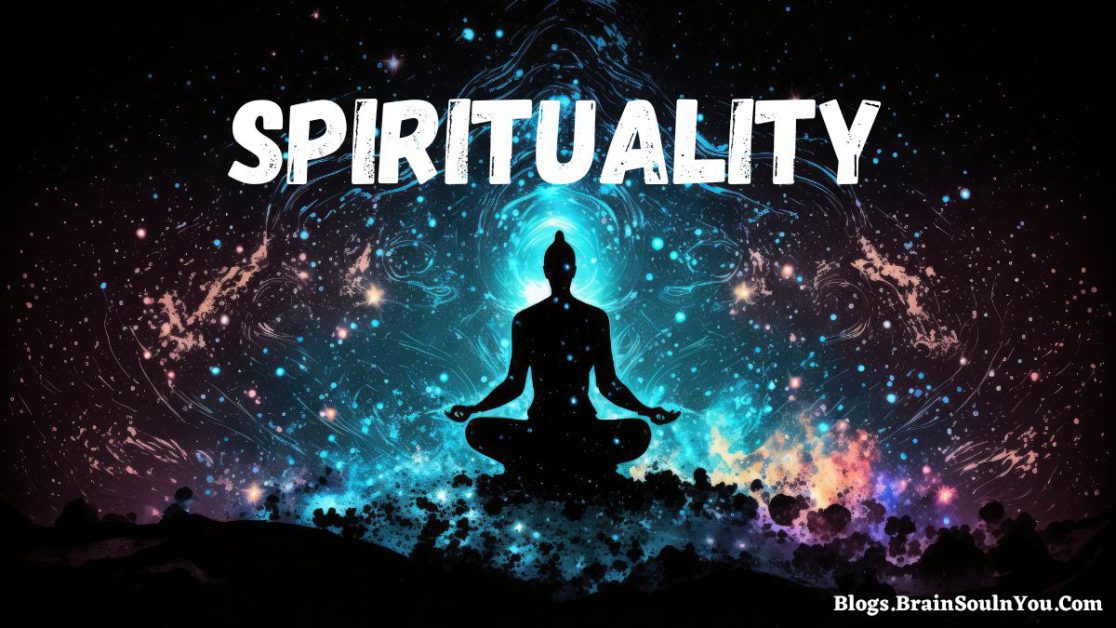Spirituality is the way that connects your inner world with your origin and with the universe. Spiritual awakening is the process to know your divine powers and getting enlightenment. People forgot the importance of spirituality and start following religions. There is a huge difference between spirituality and religion. All should give importance to spirituality and it should become a part of the education system too.
Spirituality is basically doing meditation and observing everything around you. It is about living in yourself and detaching from anything. When you do it you start seeking all the knowledge and truth revealing in front of you.
What is Spirituality?
Spirituality is a broad and subjective concept that relates to the search for meaning, purpose, and connection to something greater than oneself. It involves exploring the inner self, seeking a deeper understanding of life’s mysteries, and connecting with the transcendent or divine.
While spirituality is often associated with religious beliefs and practices, it can also be experienced in a secular context or through personal beliefs and philosophies. It encompasses various aspects, such as self-reflection, self-discovery, mindfulness, compassion, gratitude, and the exploration of values and ethics.

Spirituality is a deeply personal and individual experience, and it can take many different forms depending on one’s beliefs, culture, and life experiences. It may involve practices like meditation, prayer, contemplation, yoga, nature connection, or engaging in activities that promote a sense of inner peace, harmony, and connectedness.
Spirituality is not limited to any specific religious tradition or set of beliefs. It is a journey of self-discovery, personal growth, and seeking a sense of purpose and fulfillment in life. It is a way to cultivate a deeper understanding of oneself, others, and the world around us, and to find meaning and connection in the broader tapestry of existence.
Importance of Spirituality
Spirituality holds significance in many individuals’ lives for several reasons:
Meaning and Purpose: Spirituality provides a sense of meaning and purpose. It helps individuals connect with something greater than themselves, whether it’s a higher power, universal energy, or a deeper sense of self. It can offer guidance, direction, and a framework for understanding the world and one’s purpose in it.
Inner Peace and Well-being: Spirituality often involves practices such as meditation, prayer, or mindfulness, which can promote inner peace, calmness, and emotional well-being. Engaging in these practices allows individuals to cultivate a sense of serenity, reduce stress, and enhance overall mental and emotional health.
Connection and Unity: Spirituality can foster a sense of connection and unity with others and the world around us. It encourages empathy, compassion, and understanding toward others, promoting harmonious relationships and a sense of community. It recognizes the interconnectedness of all beings and encourages a broader perspective on life.
Resilience and Coping: Spirituality can serve as a wellspring of inner strength and resilience in the face of adversity. It offers a guiding framework to find meaning in challenging situations, navigate the complexities of loss and grief, and embrace life’s uncertainties. Spiritual beliefs and practices can bring solace, ignite hope, and provide a profound sense of support during difficult circumstances.
Values and Ethics: Spirituality often involves reflecting on and aligning with core values and ethical principles. It can guide individuals in making moral choices, living a life of integrity, and contributing positively to society. Spirituality can inspire a commitment to kindness, compassion, justice, and personal growth.
Transcendence and Transpersonal Experiences: Spirituality explores the realm beyond the physical and material, inviting individuals to explore transcendent experiences and connect with the divine or the sacred. These experiences may include feelings of awe, wonder, mystical encounters, or a sense of unity with something greater.
Self-Discovery and Personal Growth: Spirituality encourages introspection, self-reflection, and self-awareness. It provides a pathway for personal growth, self-discovery, and transformation. Through spiritual practices, individuals can explore their values, beliefs, strengths, and areas for growth, leading to personal development and a deeper understanding of oneself.
Spirituality vs Religion
Firstly, spirituality is choosing your own way and following something on your own. Religion is following other ways and other rules.
Secondly, religion attaches you to itself and to people who belong to a particular religion. On the other hand, spirituality detaches you from anything. That is a symbol of being in yourself and enjoying the piece.
Furthermore, spirituality grants you boundless possibilities while religion encourages living within certain limitations. Crucially, spirituality allows for the exploration of personal experiences, whereas religion often involves placing faith in the experiences of others.

In a time of technology and in the modern world people aside from spirituality start following religions. There is a difference between Spirituality and religion. To know the importance of spirituality knows it’s different from religion.
Spirituality and religion share connections but possess notable distinctions:
Spirituality:
- Spirituality is a broader concept that relates to an individual’s personal connection, exploration, and understanding of the divine, transcendent, or sacred.
- It can be viewed as a personal and subjective experience that encompasses a sense of meaning, purpose, inner growth, and connection to something greater than oneself.
- Spirituality can be practiced both within and outside of religious frameworks, and individuals may engage in spiritual practices such as meditation, mindfulness, or self-reflection.
Religion:
- Religion typically refers to organized systems of beliefs, practices, rituals, and moral codes that are shared by a community or group of people.
- It often involves adherence to specific doctrines, religious texts, and the worship of deities or higher powers.
- Religions often provide a framework for communal worship, religious ceremonies, and organized religious institutions, such as churches, mosques, or temples.
- Religious practices and rituals can play a central role in the lives of individuals who follow a specific religion.
Key Differences:
Personal vs. Communal: Spirituality is often seen as a personal and individual journey of seeking meaning and connection, while religion involves a shared set of beliefs, practices, and communal aspects.
Flexibility vs. Established Doctrine: Spirituality allows for more personal interpretation, exploration, and flexibility, whereas religion often has established doctrines, rituals, and specific practices that followers are expected to adhere to.
Organized Institutions: Religion typically involves organized religious institutions and hierarchies, while spirituality can be practiced individually or within various informal groups or communities.
Belief Systems: Religion often encompasses specific belief systems, dogmas, and religious texts, while spirituality can encompass a broader range of beliefs, including those outside of traditional religious frameworks.
What is a Spiritual Awakening?
Spiritual awakening means raising the divine powers that are hidden in you. Spirituality is the only way that helps you to know yourself so that you can connect with your origin. It is basically raising the levels of consciousness. To know more about consciousness and levels of consciousness read the related blog on that. Click Here
Spiritual awakening is the process that helps you seek the knowledge that hiding inside you and helps you to reveal the truth. It changes your vision of looking universe in other ways.

Spiritual awakening refers to a profound shift in consciousness and perception, often accompanied by a deepening of spiritual awareness and connection. It is a personal and transformative experience that can bring about significant changes in one’s beliefs, values, and perspective on life.
Here are some key aspects of spiritual awakening:
Expanded Awareness: During a spiritual awakening, individuals may experience a heightened sense of awareness and consciousness. They may perceive a deeper interconnectedness between themselves, others, and the world around them. There is a recognition of the underlying unity and oneness of all existence.
The shift in Perception: A spiritual awakening often involves a fundamental shift in how one perceives reality. Individuals may develop a more holistic and intuitive understanding, going beyond the limitations of the egoic mind and embracing a broader perspective.
Transcendence of the Ego: The ego, which represents the individual’s sense of self and identification with their thoughts, emotions, and roles, maybe transcended or seen through during a spiritual awakening. There is a realization of the illusory nature of the ego and a deeper connection to one’s true essence or higher self.
Inner Transformation: Spiritual awakening can lead to profound inner transformation. This transformation involves shedding old patterns, limiting beliefs, and attachments that no longer serve one’s growth and authenticity. It often involves healing past wounds and embracing greater self-love, compassion, and forgiveness.
Connection to Spirituality: Individuals undergoing a spiritual awakening often experience a deepening of their spiritual connection. This can involve a renewed interest in spiritual practices, such as meditation, prayer, yoga, or contemplative reflection. There is a desire to explore spiritual teachings, wisdom traditions, and mystical experiences.
Heightened Intuition and Insight: As awareness expands, individuals may develop a heightened sense of intuition and insight. They may experience moments of clarity, deep knowing, and intuitive guidance that guide their choices and actions.
Alignment with Higher Purpose: A spiritual awakening often brings a clearer understanding of one’s higher purpose or calling in life. Individuals may feel a deep sense of meaning, direction, and a desire to live in alignment with their authentic selves and spiritual values.
Integration and Embodiment: Integrating the awakening experience into daily life is an ongoing process. It involves embodying insights, wisdom, and spiritual connection into one’s thoughts, words, and actions. This integration allows for a more authentic and purposeful way of living.
Process for Spiritual Awakening
Spiritual awakening is a deeply personal and individual experience, and the process can vary from person to person. However, here are some common elements and steps that individuals often go through during a spiritual awakening:
1. A Desire for Something More
The first step is often a deep yearning or longing for a greater sense of meaning, purpose, or connection in life. There is a sense that there is something beyond the material world and a desire to explore and understand it.
2. Self-Reflection and Questioning
During this stage, individuals begin to question their beliefs, values, and the nature of reality. They may engage in self-reflection, contemplating the deeper aspects of life and their own existence. This can involve questioning the meaning of suffering, the purpose of life, and their own identity.

3. Seeking Knowledge and Wisdom
Individuals may embark on a quest for knowledge, seeking spiritual teachings, texts, or guidance from various sources. They explore different philosophies, religions, spiritual practices, or teachings that resonate with them.
4. Inner Transformation and Healing
As individuals delve deeper into their spiritual journey, they may undergo significant inner transformation and healing. This can involve releasing past traumas, letting go of limiting beliefs, and cultivating self-love and acceptance. Inner work, such as meditation, mindfulness, or energy healing, may play a significant role during this stage.
5. Expanded Awareness and Insight
During a spiritual awakening, individuals often experience moments of expanded awareness, insights, or profound realizations about the nature of reality, their interconnectedness with others, or their own spiritual nature. These experiences can be transformative and lead to a shift in perspective.
6. Integration and Alignment
As individuals progress through their spiritual awakening, they begin to integrate their newfound insights and wisdom into their daily lives. They align their thoughts, beliefs, and actions with their higher self or spiritual values, seeking greater authenticity and congruence.
7. Service and Connection
Many individuals feel a deep desire to contribute to the well-being of others and the world. They may engage in acts of service, kindness, or social activism as a way to express their spiritual values and make a positive impact.
Meditation Practices for Spiritual Awakening
For spiritual awakening, you need to do deep meditation consistently. That required full dedication and a lot of sacrifices. Meditation can be a powerful practice to support spiritual awakening and deepen your spiritual connection. Here are some meditation practices that can aid in the process of spiritual awakening:
Mindfulness Meditation
Mindfulness meditation involves cultivating present-moment awareness without judgment. By focusing your attention on the sensations of the breath, bodily sensations, or sounds, you develop a greater capacity to observe thoughts and emotions without getting caught up in them. This practice can help develop a deeper sense of presence and create a foundation for spiritual exploration.
Loving-Kindness Meditation
Loving-kindness meditation also referred to as metta meditation, focuses on cultivating feelings of love, compassion, and kindness towards oneself and others. This practice nurtures a sense of interconnectedness and encourages an approach to life rooted in the heart. By extending well wishes and positive intentions to all beings, you foster a deeper sense of compassion and empathy within yourself.
Inquiry or Self-Reflection Meditation
This meditation practice involves contemplation and self-inquiry to explore deeper existential questions or inquire into the nature of the self. You can use prompts or questions like “Who am I?” or “What is the nature of reality?” to guide your inquiry. The goal is to go beyond conceptual thinking and allow insights to arise from a place of direct experience.

Visualization Meditation
Visualization meditation involves using the power of imagination to create mental images that support your spiritual awakening. You can visualize yourself surrounded by light, connecting with a higher power or divine energy, or envisioning your highest potential. Visualization can help deepen your connection to the spiritual realm and align with your spiritual aspirations.
Chanting or Mantra Meditation
Chanting or mantra meditation involves the repetition of sacred sounds, words, or phrases. This practice can help quiet the mind, focus your attention, and create a vibrational resonance that supports spiritual awakening. Examples include chanting Om, reciting affirmations, or repeating a specific mantra.
Silent Sitting Meditation
Silent sitting meditation involves sitting in stillness and allowing your awareness to rest in pure presence. Simply observing the breath, bodily sensations, or the flow of thoughts without attachment or judgment. This practice cultivates a sense of spacious awareness and opens the doorway to profound insights and spiritual connection.
Vipassana meditation
Vipassana meditation is a Buddhist practice that involves specific techniques aimed at seeing things as they truly are. It encompasses various elements such as deep breathing, concentration on the breath, mindful observation of the inner and outer world, and visualization. To gain a deeper understanding of Vipassana meditation, it is advisable to seek guidance from a Vipassana Meditation Trainer.
Kundalini Awakening
Kundalini Awakening is a way for spiritual awakening. But kundalini is not an easy process because in this you controlling the energies becomes difficult. For that, you required a spiritual guru. So, they can guide you properly.
Rising 7 Chakras
Within our bodies, there are seven chakras: the Root Chakra, Sacral Chakra, Solar Plexus Chakra, Heart Chakra, Throat Chakra, Third Eye Chakra, and Crown Chakra. By gaining knowledge about these chakras and engaging in meditation practices focused on each of them, you can facilitate the awakening and balancing of these energy centers, leading to a harmonious alignment of all seven chakras.
Kriya Yoga
Kriya Yoga, a practice revived by Mahavatar Babaji and transmitted to his disciple Lahiri Mahasaya, gained further awareness through Paramhansa Yogananda. It is a profound science for spiritual awakening and expanding consciousness.
In Kriya Yoga, the practitioner begins by directing attention to the breath, then gradually extends awareness to the entire body, focusing on the spine and experiencing the totality of one’s being. The intricacies of Kriya Yoga practice are challenging to convey through words alone. It is highly recommended to learn directly from experienced Kriya Yoga Gurus to fully understand and embrace its transformative practice.
If you really want spiritual awakening and enlightenment find a spiritual Guru. A spiritual guru is necessary because it will teach you the right way and can give you the right direction. The experience of a guru saves you time that can be wasted in the wrong process.
In conclusion, make spirituality the most important part of life. Because it teaches you to live in yourself and make your life full of joy and peace.
Love,
Saurabh Goel
Read more blogs on The Afterlife, Consciousness Raising | Transcending the Levels of Consciousness, A Subtle Secret of Meditation: A Visual Journey in Meditation, The Main 3 Nadis – Ida, Pingala, and Sushumna
Saurabh Goel
He is the Founder and CEO of the Training and Counselling Company ‘Brain Soul & You’. He is an NLP Wellness Coach, Life Coach, Brain analyst, and Trainer for Education, Corporate, and Entrepreneurship. For more than 7 years, he delivered presentations on entrepreneurship, mind programming, and motivation. He did his B.tech in IT and later choose to be a successful psychologist. He is helping people in various ways through his counseling and training sessions.


